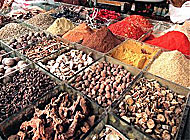Geneva and Paraguay pool biodiversity know-how

Botanists in Geneva have unveiled a programme to maintain the traditional knowledge of biodiversity in developing countries.
The first project, carried out by the city’s Botanical Conservatory and Gardens (CJB), has involved a systematic survey of the traditional herbal remedies of Paraguay.
“We need to find a purpose for a modern botanical garden,” Didier Roguet, head of the CJB’s cooperation programme, told swissinfo. “We are mainly doing scientific work, but it’s not enough. We have to apply our knowledge and give something back to the people.”
At the heart of the CJB’s new sustainable development programme is the creation of a network of botanical gardens, which can raise awareness of biodiversity locally, and collaborate with each other.
Geneva’s Paraguayan Ethnobotany project started in 1996. A similar scheme is underway in the Senegalese capital, Dakar, and another is about to begin in La Paz, Bolivia. These projects are part of Geneva’s Agenda 21 programme, whereby the city authorities fund sustainable development projects in Geneva and the South.
“We want to conserve the knowledge of the botanical resources of these countries,” said Rodolphe Spichiger, director of the Botanical Gardens.
“We observed that the Paraguayan people know their biodiversity very well. They’ve used these plants for medicinal purposes for centuries.”
However, as in many parts of the developing world, people in Paraguay are migrating from the countryside to live in cities. Although they often take their traditional knowledge with them, it is in danger of being passed on incorrectly to the next generation or not being handed down at all.
“This can be dangerous as these medicinal plants can be used in the wrong way,” said Spichiger, pointing out that people have sometimes been poisoned by taking the wrong remedy.
The joint Swiss-Paraguayan team has been checking traditional knowledge by classifying plants and analysing their toxicity. This information has then been made available to the public through a travelling exhibition and street theatre.
Many of the women who sell traditional herbal remedies in the markets of Asunción have made use of a special information centre at the city’s botanical garden. The message has also been taken into rural areas, with the help of the Swiss Red Cross.
“These people won’t benefit from globalisation tomorrow. So for the moment it’s important for them to make use of their biodiversity,” said Spichiger. “And a herbal remedy is much cheaper than a packet of aspirins.”
“Their knowledge is being eroded, and we want to give them back a knowledge that is formulated scientifically,” said Roguet. “This is really important for health care in Paraguay.”
Asunción is not the only city benefiting from Geneva’s help. The university of Dakar also asked for assistance in restoring its botanical garden, to allow local people to learn more about their environment and the uses of their local flora. Work is expected to be completed by 2003.
The CJB is also creating a protected educational zone within the Taï National Park in Côte d’Ivoire, to persuade people who have settled in the region of the importance of protecting its dense rainforest, the largest zone of its kind in West Africa.
The CJB refutes charges of scientific colonialism. It says one of the main purposes of the collaboration is to teach botanists from the developing world a specific kind of methodology, and train them to train others.
“It is also important for their self-esteem, when people from the North come and tell them they have invaluable knowledge and that they know a lot about biodiversity,” said Spichiger.
He also hoped that in the not too distant future, North-South cooperation would develop into South-South cooperation. Already, the city of La Paz has approached the CJB asking it to create an environmental education centre along the lines of the one created in Asunción. The plan is that the Paraguayan botanists will help to train their Bolivian counterparts. They are also helping out in Dakar.
Didier Roguet emphasised, however, that traditional knowledge of biodiversity is peculiar to each country.
“It would be dangerous to globalise this knowledge,” he said. “We can globalise the methodology, but every country has its own knowledge and traditions, dating back thousands of years. You cannot transfer the knowledge of Paraguay to Senegal.”
by Roy Probert

In compliance with the JTI standards
More: SWI swissinfo.ch certified by the Journalism Trust Initiative








You can find an overview of ongoing debates with our journalists here . Please join us!
If you want to start a conversation about a topic raised in this article or want to report factual errors, email us at english@swissinfo.ch.